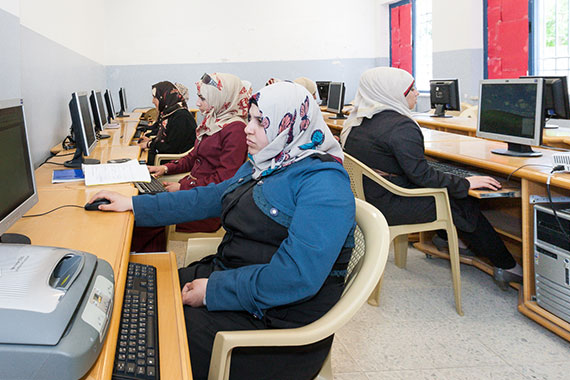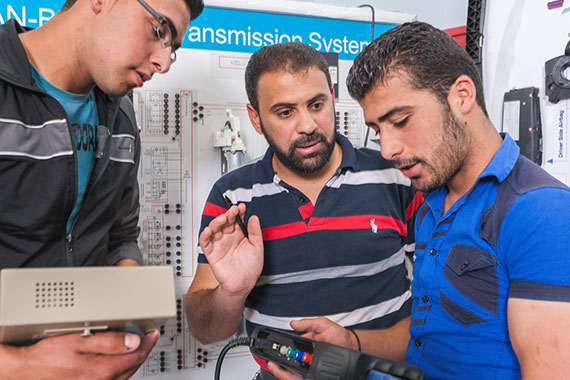Skilled Worker Development for Industry 4.0

The digitalised world of work is changing the development of skilled workers
The technical integration of cyber-physical systems within production and logistics is progressing at an unstoppable rate. The Internet of Things and Services involves 'smart devices' with embedded computers and, increasingly, industrial processes will be run by devices such as these which will also communicate with one another. This development has far-reaching consequences for all business areas and company processes. However, this can only function at all if there is a supply of appropriately qualified skilled workers. In order to remain internationally competitive, all companies have to meet this challenge - both in Germany and across the world.

Skilled worker competencies for Industry 4.0
The demands on workforce and management increase in line with the tasks involved. Previously, activities related to manufacturing and maintenance have been of prime importance in industrial production. In the future, the production organisation will assume an increasing key role. This is performed with the aid of production controls based on cybernetic support systems and intelligent sensor technology. High-performance hardware components make it possible to handle larger amounts of data from the production processes. The information obtained supports employees far more effectively than previously in medium to long-term decision making with respect to the planning and adaptation of production processes.
Taken as a whole, the stronger interlinking of a large number of occupations using modern technology will result in increased permeability between areas of education and training that were previously separated. Skilled workers of the Industry 4.0 generation will become all-rounders with interfacing expertise. In future, a broad merging of areas of work traditionally classed as either blue collar (production workers) or white collar (knowledge workers) will take place. The age of the grey collar worker is dawning. This also means that, in future, companies will not locate in areas where wages are lowest and subsidies are highest, but instead in areas where they are most likely to find the qualified specialists which are right for them.

Digital learning content and learning methods
Advancing digitalization in companies demands initial and continuing vocational education that is more strongly information technology (IT)-based and oriented. IT competence plays a key role in virtually all areas of employment. Its significance will continue to grow, although not to the same extent in all occupations. Expertise in how to deal with hardware and software will be demanded at a greater number of qualification levels than before.
The learning content required is also changing the way in which expertise is transferred. Learning is increasingly IT-supported. Digital media offers flexible forms of distance learning and an increasing amount of (accessible) education and training materials are available on-line. Today, learning is no longer time and location-dependent and can take place at virtually any time and in any place.
This results in opportunities for new didactic concepts and pedagogic approaches. The different ways we use media and the broad availability of innovative technical options create new opportunities to improve and individualize the design of the learning process. Learning is becoming more collaborative, more mobile, more relaxed, more modular, more experience-oriented, more multi-sensory and more interactive. Education and training sequences must fit within this new learning culture. Online learning, learning using data goggles or in online communities will add to, if not replace, classical learning methods.
The changes in the economy are taking place increasingly quickly as innovation cycles are shortening. The demands on employees over the course of their professional life are changing ever more rapidly. Software knowledge is updated entirely in the space of two to five years. In the future, workers will have to adapt even more flexibly to new requirements. This results in a greater need to update qualifications on an ongoing basis. We have to anticipate that the amount of continuing education and training required will increase.

Digital up-scaling of education and training
Companies are increasingly seeking to take advantage of the young learners' enthusiasm for modern communication technologies. In order to develop and expand an appropriate qualification strategy in their businesses, many companies are seeking initial and continuing education and training partners with a clear competency in the area of IT-supported learning. Today, education managers and IT experts are in collaboration on a number of projects to turn innovative models of knowledge acquisition into actual learning experiences. 'Learning factories 4.0' and 'Azubiclouds' (cloud-based provision for trainees) are already in use today.
Demand exists for practically-oriented learning content presented in a digital form in many of the world's economies. At this year's showcase for the sector, 'Learntec', more than 200 exhibitors came together to present their qualification solutions for Industry 4.0. Many of these providers cooperate with industrial companies operating at a global level who are training their employees around the world using digital teaching tools and methods.
The iMOVE education and training export initiative from the Federal Ministry of Education and Research brings together within their network a large number of German training companies with a range of options for competence development to support Industry 4.0.
- Author: Silvia Niediek, iMOVE
- Published in: Education Guide 2016/17 – Partnerships and Perspectives of Arab-German Cooperation
Education Guide 2016/17
The guide ist published for the 7th Arab-German Education and Vocational Training Forum.
Source: iMOVE